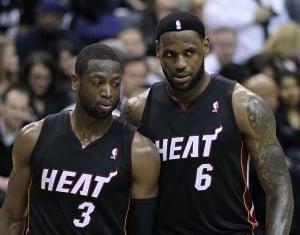 Did the Miami Heat win the NBA Finals championship against the San Antonio Spurs June 20 because the Heat’s players acted unselfishly, on the premise that “there’s no ‘I’ in ‘team’”?
Did the Miami Heat win the NBA Finals championship against the San Antonio Spurs June 20 because the Heat’s players acted unselfishly, on the premise that “there’s no ‘I’ in ‘team’”?
That’s the view Magic Johnson—the former pro turned ABC sports analyst—expressed when talking with the Heat’s Dwyane Wade after the game. Johnson said that in 2010, when the Heat’s management recruited superstar LeBron James, Wade was the only star who would have taken a backseat to him.
“You’re the greatest unselfish superstar that has ever played in this game,” Johnson told Wade.
But Johnson’s comment, although a common view in sports, doesn’t make sense.
Wade and James agreed to play together because each wanted to win basketball games—and to enjoy all the fruits that come with that, such as enormous salaries and superstar status. Each man helped his team win for his own selfish interests.
Wade, who won his first NBA championship with the Heat in 2006, said that welcoming James to his team was “one of the hardest things I had to do.” But after he’d watched Los Angeles Lakers superstar Kobe Bryant win his fifth NBA title in 2010, he thought:
I want that again. . . . And that started the journey to say: how can I put myself in a position to be on a team that can compete for a championship every year? I knew that I was going to have to take a step back. It wasn’t easy; it’s still not easy but I wanted to win. I wanted to win big. That’s why I play a team sport.
Wade’s comment mirrors something Bryant said in an interview earlier this year regarding his efforts to refine his playing strategy: "What I'm doing now is being selfish. I'm trying to help the team because I want to win a championship."
 A player who thinks and strategizes and tries to win is by that fact a selfish player. A player who fails to think, fails to strategize, and thus really doesn’t try to win is by that fact an unselfish player. Unselfishness can manifest in several ways. For instance, if a player hogs the ball when other teammates could handle it better, he is not helping himself; he is harming himself. He is being unselfish. (To call that “selfish” makes no sense.) An even more unselfish player might miss baskets on purpose or pass the ball to the other team to help his opponents win. That would be pure unselfishness.
A player who thinks and strategizes and tries to win is by that fact a selfish player. A player who fails to think, fails to strategize, and thus really doesn’t try to win is by that fact an unselfish player. Unselfishness can manifest in several ways. For instance, if a player hogs the ball when other teammates could handle it better, he is not helping himself; he is harming himself. He is being unselfish. (To call that “selfish” makes no sense.) An even more unselfish player might miss baskets on purpose or pass the ball to the other team to help his opponents win. That would be pure unselfishness.
It’s time for athletes to adopt the correct language here—the language Bryant uses: "What I'm doing now is being selfish. I'm trying to help the team because I want to win a championship." That’s the truth. Why not speak it?
Congratulations to Wade, James, and the Miami Heat for their championship victory. It was a magnificently selfish achievement.
Like this post? Join our mailing list to receive our weekly digest. And for in-depth commentary from an Objectivist perspective, subscribe to our quarterly journal, The Objective Standard.
Related:
Creative Commons Image: Keith Allison


![[TEST] The Objective Standard](https://test.theobjectivestandard.com/wp-content/uploads/2017/10/logo.png)










